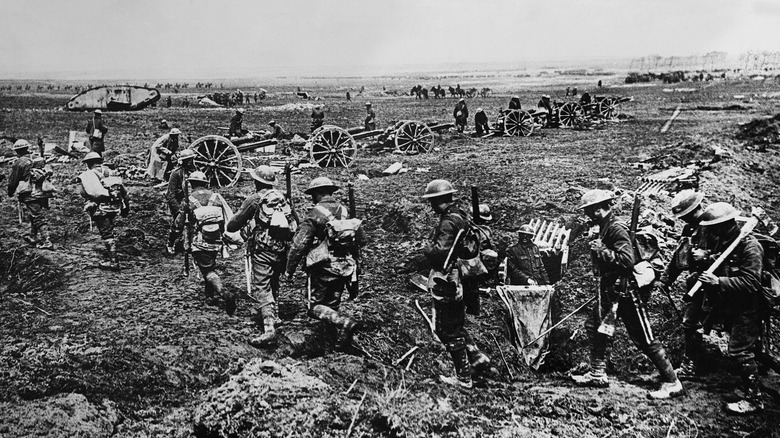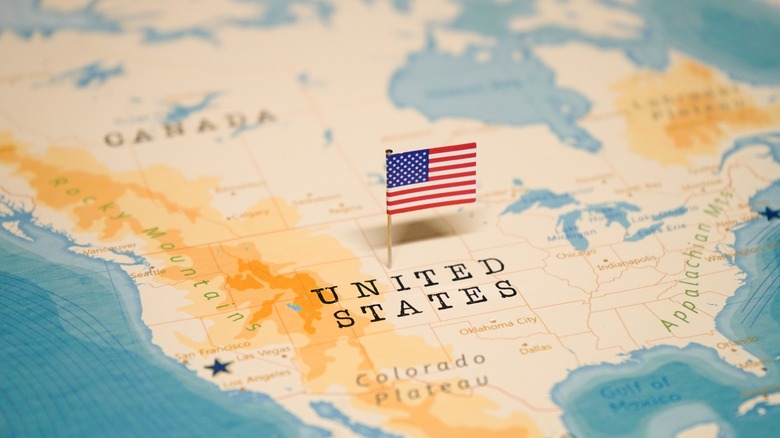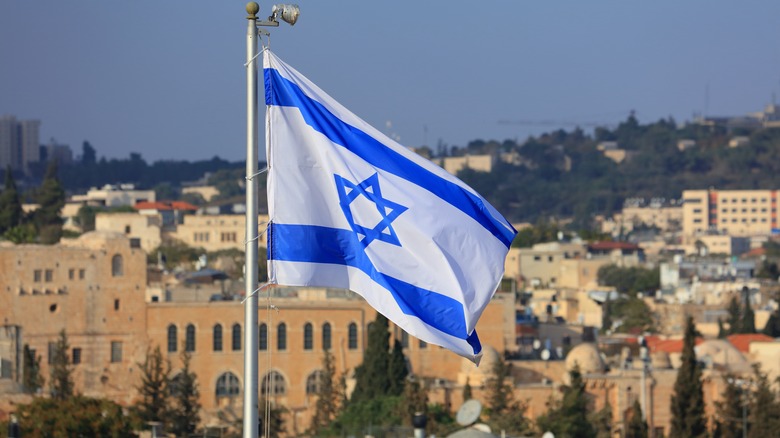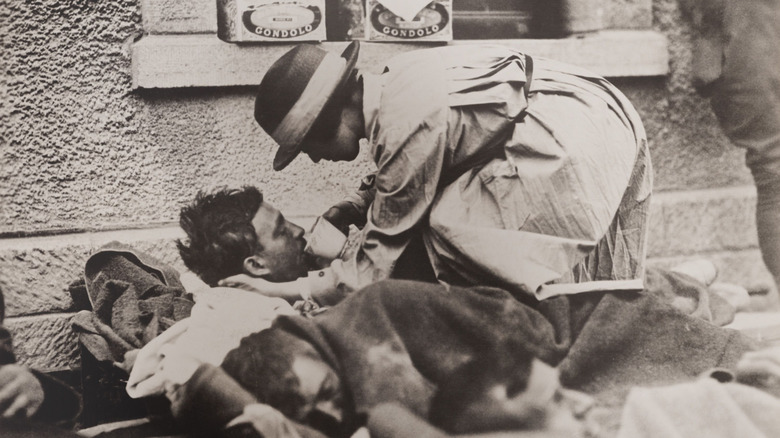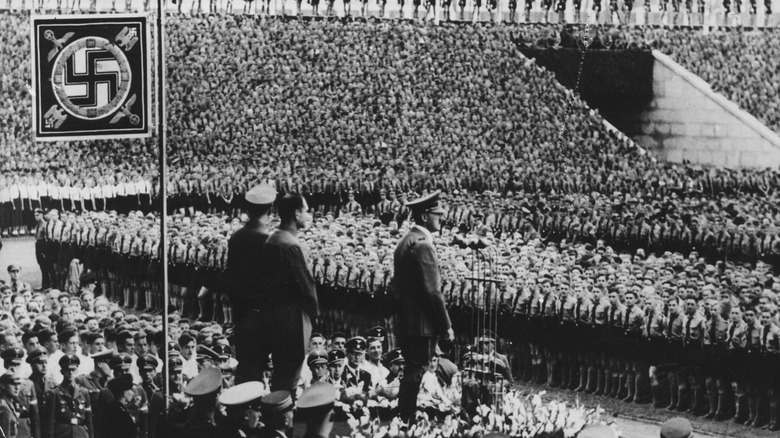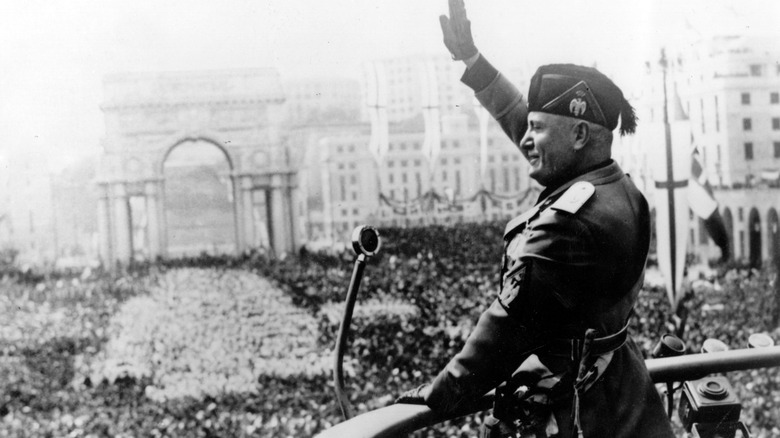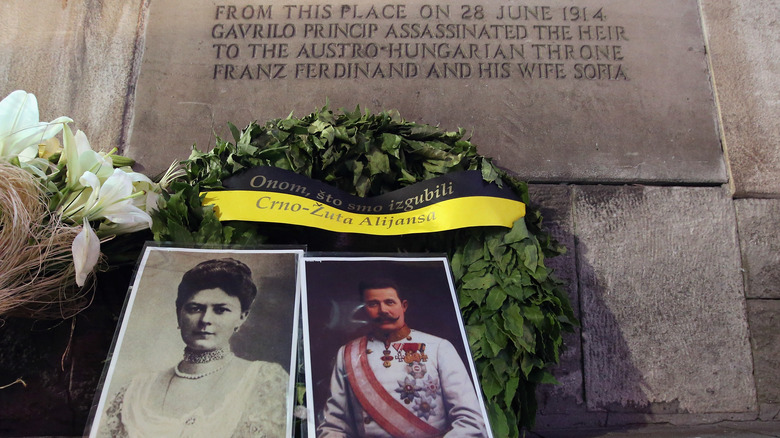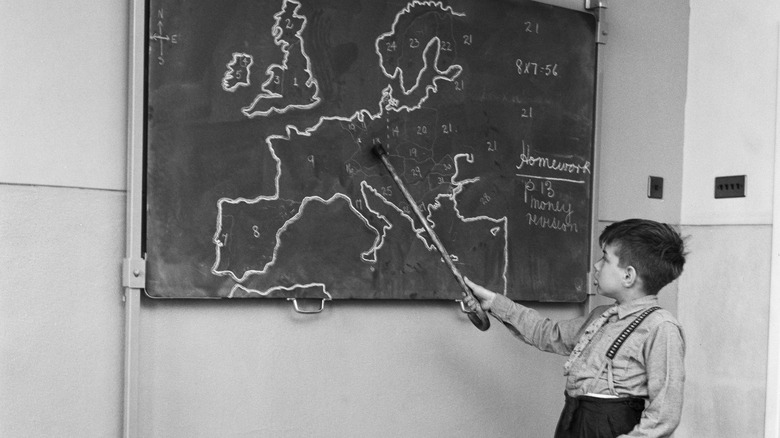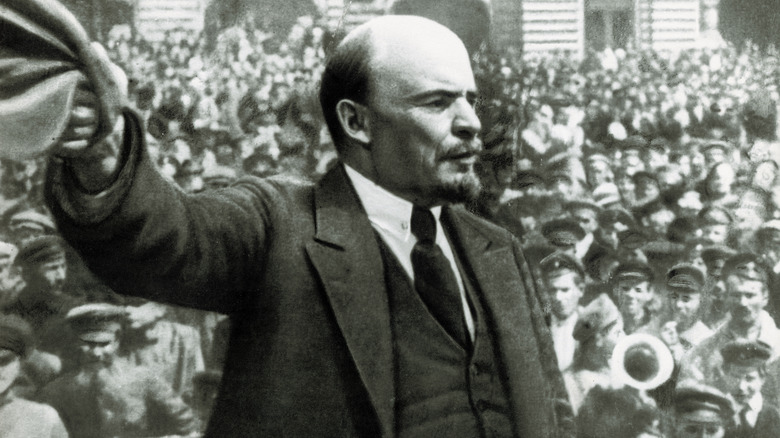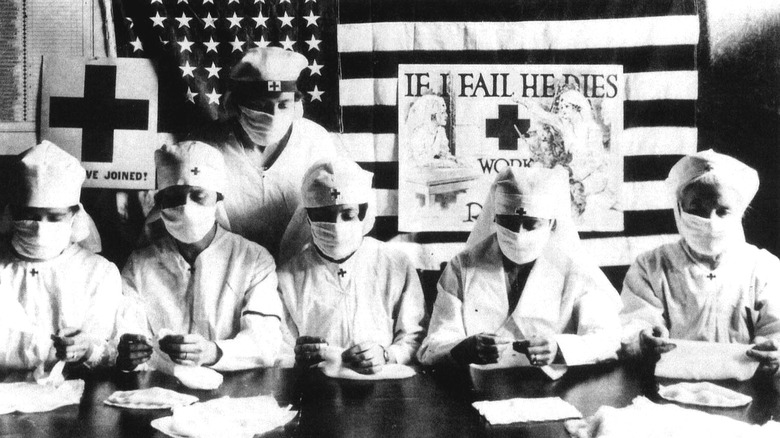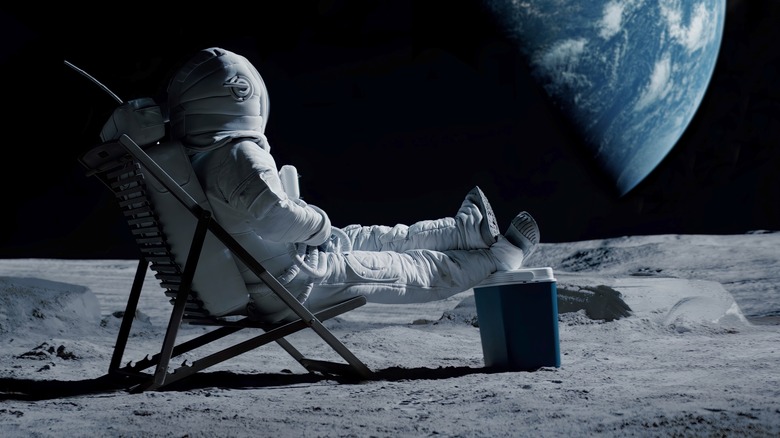What The World Would Look Like If World War I Never Happened
The 20th century was filled with sprawling, all-encompassing, devastating events felt around the world. From the Great Depression and Spanish flu to two World Wars, it was pretty dismal at times. Good ol' days, indeed. But since alternate history and what-if scenarios are pretty fun, let's talk about what might have changed without one of the biggest, longest, most brutal wars in recent history: World War I.
And here's the thing: It's kind of a fluke that it started in the first place, and if it wasn't for one single, split-second event, it might not have happened. The general consensus is that the Great War kicked off with the assassination of Archduke Franz Ferdinand and escalated from there. According to a theory presented by historian and King's College London professor Richard Ned Lebow, if the archduke hadn't been shot — or if he had survived — World War I probably wouldn't have happened. So this conjecture? It's not actually as far-fetched as it might seem at a glance. Lebow explained (via the BBC) that the assassination removed one of the most powerful voices championing the avoidance of war, and his death "removed this brake... [and created] a pretext and incentive to go to war."
Lebow also says that thought exercises exploring "what if" scenarios can help throw current events into a new perspective — and that can be incredibly important. With that in mind, let's take a look at what the world might look like today if there had been no World War I.
American identity would be different
World War I shaped the United States' identity and paved the way for debates that still rage on today — most notably interventionism versus isolationism. President Woodrow Wilson supported the latter during his 1916 campaign and popularized the phrase "America First," which has become a slogan for an isolationist U.S. policy stance. Understandably, his change of heart and decision to enter the country into WWI — a war not directly tied to American interests or fought on American soil — was controversial. It was opposed by Senator Henry Cabot Lodge, who, like many today, believed that America should not be tied to or influenced by international bodies (like NATO) and be free to make decisions based on its own interests. The "America First" movement has seen multiple resurgences throughout the years, including in the 1930s amid tensions in Europe and in the 21st century thanks to former President Donald Trump.
Per the National Endowment for the Humanities, historian and writer A. Scott Berg said "modern America's very identity was forged" during the Great War.
Israel might not exist
In "Archduke Franz Ferdinand Lives! A World Without World War I," author and political scientist Richard Ned Lebow argues that Israel — which was established as a state in 1948 — might not have existed without the driving force of World War I. He suggests multiple possible fates for Israel without the Great War, but the throughline in his argument is that Jewish and Palestinian nationalism would be blunted. Notably by significantly less Jewish immigration to the Yishuv (where Jewish people existed in historical Palestine long before the State of Israel was established) and fewer tensions with Arabs. Without such "clashing nationalisms," he writes, the "Israel-Palestinian problem would not have become connected to oil the way it did, opening the prospect of a different configuration of political and economic forces in the Middle East."
Others argue that the Holocaust was a driving force in the establishment of Israel — and with no World War I and II, the state would not exist today. Israel historian Evyatar Frieselhe doesn't agree. In a piece for the country's official Holocaust memorial, Yad Vashem, he argues for distinguishing between "the influence of the Holocaust as a historical occurrence" and "the Holocaust as a molding factor in later Jewish consciousness." In the case of the second, he writes, "There seems little reason to believe that the Holocaust influenced the creation of the Jewish state. ... The emergence of the State of Israel in 1948 occurred long before then."
While mortality rates would go down without WWI, so would quality of life
While World War I led to many atrocities across the globe, it did have its silver linings in terms of medical and social advancement. According to the BBC, often-fatal conditions such as broken thigh bones, open wounds, and viral infection were rendered survivable by advancements in treatment that came about because of the war. Without the global conflict, procedures we take for granted would have likely taken far longer to materialize, if they were developed at all. In general, the technology gap would become even more apparent with the absence of World War II, when helicopters, rockets, jets, and computers began to take familiar shapes.
The Great War also led to an unprecedented rise in women assuming male occupations in factories and farming. While many left these fields after the war, this experience with egalitarianism led to many women's rights groups pushing for greater equality in government and society. Gender equality likely would have been heavily sidelined by a lack of pressure on governments to allow women into such professions. That is if women's suffrage even remains a guarantee in this scenario, as Europe's less-than-democratic monarchies would likely have lasted far longer without World War I to tear them apart.
Hitler and the Nazis wouldn't have risen to start World War II
Perhaps the biggest consequence of World War I was the rise of Adolf Hitler and his Nazis, which led the world right back into another all-encompassing war. Would we have seen World War II without the first one? University of Cambridge Regius Professor of History Chris Clark says no.
Clark joined in a conversation with NPR and agreed with other historians taking part in the "what if?" round table: Without World War I, there would be no Hitler and no Nazis. Hitler needed a rallying cry to stir Germany to his side, and that was in large part his rhetoric about how unfair the World War I-ending Treaty of Versailles was. Germany lost territories, had to pay reparations, and had to give up a huge portion of its military. The country's economy was destabilized to the point that one American dollar could buy four billion German marks.
It's a complicated time in history, but in a nutshell, World War I allowed Hitler to wade into a devastated country and promise two major things: a way forward, and someone to blame. That was, of course, Germany's Jewish population, and the plan from the beginning was to install Hitler as a dictator who would lead Germany back to greatness. Without World War I, there would have been nothing to rebuild, no promises to make, and no stepping stone for the rise of the Nazis.
The Holocaust wouldn't have happened
According to historians at the United States Holocaust Memorial Museum, one of the major things that contributed to the mass genocide now called the Holocaust is the widespread instability left behind in the aftermath of World War I. That allowed for the rise of Hitler and the Nazis, buoyed by promises of a better future ... along with promises to punish those they preached were responsible for Germany's defeat in the first place.
Without Hitler and the Nazis, they say, there would be no Aryan race ideology, no ideas of German purity, no Holocaust, and no deaths of millions. And what would that mean?
Sergio DellaPergola is a demographer and a professor of Israel-Diaspora Relations at the Hebrew University, and in 2009, he published research that looked at the impact that the Holocaust had on the world's Jewish population. Between 1939 and 1945, the number of Jewish people worldwide dropped from 16.5 million to 11 million. He extrapolated what the population would be like if there had been no Holocaust, and found (via Science Daily) that various factors would have led to a current-day population of between 26 million and 32 million. By comparison, the Jewish Virtual Library estimates 2010's Jewish population to have been around 14 million. That had risen to only about 15.1 million by 2021, when DellaPergola told the National Post, "This is quite impressive to think that the Holocaust of the Jews is still visible. The damage is still visible and not yet recovered to its early dimensions."
Benito Mussolini wouldn't have had the backing to turn Italy fascist
Although there were many countries involved by the end of World War II, it was Benito Mussolini's fascist Italy that joined Germany and Japan to form the heavy hitters of the Axis powers, and here's the thing: Without World War I, Mussolini may not have even gone down the road of facism, much less taken over the country. Pre-World War I, he was actually a socialist, left-leaning journalist who worked with trade unions. What changed? The war.
Initially a member of the Italian Socialist Party, Mussolini was kicked out of the party for being very vocal about his opinion that Italy needed to get involved with World War I. He went on to form the Fasces of Revolutionary Action, and things escalated from there. Much like what happened in Germany at the end of the war, scores of Italians were of the opinion that they had been treated with wild unfairness in the Treaty of Versailles. Mussolini formed another group — this one with a military agenda — and was able to rally the discontented masses around his paramilitary Blackshirts.
The Blackshirts swept through the country, giving him the platform to establish the National Fascist Party and ultimately seize control of Rome's government. It all went back to World War I — without the war, there would have been no cause for Mussolini to champion, and to build his empire on.
The Austro-Hungarian empire probably wouldn't have fallen
At the time of the assassination of Archduke Franz Ferdinand, the Austro-Hungarian empire was huge. The archduke was the nephew of the emperor Franz Joseph, and as his immediate successor and the archduke's father had already died, that made Franz Ferdinand next in line to rule. He'd already made it clear that he intended to grow the empire's power, and it's entirely possible that without World War I, the Austro-Hungarian empire would have continued to thrive.
That's according to one of the family's descendents, Maria Camilla Habsburg Lothringen, who told the BBC, "We would maybe have a different position here in Austria. Maybe we would have more possessions, and more responsibility in our functions." She wasn't alone in thinking that: Her suggestion is also supported by University of Calgary professor Holger Herwig.
If the empire hadn't become embroiled in a war that they ultimately lost, they wouldn't have been forced to cede huge sections of territory with the Treaty of Versailles. Historians draw a direct line from the assassination to the war to the loss of major land holdings and a division between the national groups in Hungary, right to Hungary throwing in with Nazi Germany. "The War That Ended Peace" author Margaret MacMillan goes a step further, telling NPR that the empire would have continued to thrive and act as a stabilizing presence in Europe. Instead of a shattered empire, she sees the earlier development of a European Union-like entity.
European countries might have formed a world-changing alliance
The European Union was established in 1993, but without World War I, it's entirely possible that some sort of other massively inclusive entity would have been formed much sooner. That's according to Margaret MacMillan, the author of "The War That Ended Peace," who told NPR that there had been talk of such a broad, sweeping union in the years leading up to the war. It would have been a huge deal, binding together cities — such as Budapest, Vienna, London, and Berlin — that were developing culture and science at a blinding pace.
MacMillan also says that there would have been a world-changing alliance made between Britain and Germany, famously the biggest powerhouses on opposite sides of both world wars. MacMillan argues that without the division that happened with World War I, they would have been the best of friends — and there's no telling what would have come from it, especially considering how it would have allied most of Europe's military might.
It would have been a sort of naturally developing partnership, buoyed by their entwined royal families. They had already been vital trade partners, and they often swapped some of their most brilliant young minds via each country's prestigious universities. It's impossible to tell what might have happened next, but a 20th century driven by British and German collaboration instead of conflict would have created a very different world.
Russia would look very different
Margaret MacMillan, author of "The War That Ended Peace," also suggests (via NPR) that without World War I, there would have been no Cold War. In fact, she says there's a likelihood that Russia and the United States would have developed similar ideologies, and adds that it would have had far-reaching consequences.
But first, how did she get there? When Czar Nicholas II declared war on Germany in 1914, it was the start of his dynasty's downfall. The war led to his abdication and eventual execution, and fostered the perfect storm of revolt, revolution, and discontent that allowed Bolshevik leader Vladimir Lenin to step into power. When Czarist Russia waded into a war it was vastly unprepared for, its economy crumbled, people starved, wartime casualties mounted, and so did discontent — and it wasn't helped by the fact that Russian people looked to their czar and saw the German ancestry of his wife.
Civil war overlapped with World War I, and the establishment of the Soviet Union was part of a chain of events that included the rise and spread of Communism. Without World War I, China may also have had a very different history, along with other Communist countries such as Cuba. It's also possible to go one step more and suggest that without Bolshevik rhetoric endorsing the mass genocide of enemies, some of the darkest chapters in recent history — like the rise of Pol Pot in Cambodia — may not have happened, either.
Spanish flu wouldn't have killed millions ... or overhauled public health systems
It's not clear just how many deaths the Spanish flu pandemic caused, although the general consensus is that the number is somewhere around 50 million. John Mathews is an Honorary Professorial Fellow at the University of Melbourne, and he told The Conversation that it was responsible for killing as much as 6% of the world's population, and it wouldn't have ... if it hadn't been for World War I.
That conflict, he said, presented a few worst-case scenarios. In addition to the front lines providing breeding grounds for disease, millions of soldier were packed together in close contact, making infection more likely to spread. When they went home — often to previously isolated communities that had no natural immunities — the flu spread like wildfire, with some areas suffering losses much, much higher than that 6%.
There's another consequence, too. The necessity of dealing with illness on such a grand scale led to the overhaul of public health systems, which varied based on the country. For many European countries, it meant the rise of socialized healthcare and the increased availability of medications and treatment, while in the U.S., it meant the development of health insurance. Everywhere, though, it meant disease outbreaks were being seen as a social concern as well as a medical one: Systems for reporting outbreaks were put in place and international coalitions formed, now armed with the knowledge that disease didn't stop at borders. Without the Great War, that might not have happened.
Technology would have developed more slowly, and there probably wouldn't be a moon landing
With World War I, the rush to develop cutting-edge technology that would give entire nations the advantage kicked into high gear. Without the war, King's College London professor Richard Ned Lebow suggests (via NPR) that key technologies such as aviation, vaccines, and antibiotics would have been much slower in developing. He suggests that the effects would have even reached further than that, delaying the development of things like information technology and advanced weaponry.
Margaret MacMillan, the author of "The War That Ended Peace," agreed. She even went a step further, suggesting that without World War I, there probably wouldn't have been a space race, and the moon landing wouldn't have happened when it did — if it happened at all. Without the development of the Soviet Union, there would have been less of a reason for the U.S. to try to flex some serious scientific muscle and make it to the moon first.
And that in itself would have had monumental consequences. NASA historian Roger Launius explained to LiveScience that without the space race, an enormous amount of money would have been spent elsewhere — probably, he suggests, in the U.S. military. He also says there was a strong possibility that instead of seeing billions of dollars pumped into space, Lyndon Johnson may have gotten his way and seen it spent on combating domestic poverty. And that? It may have had shocking consequences.
